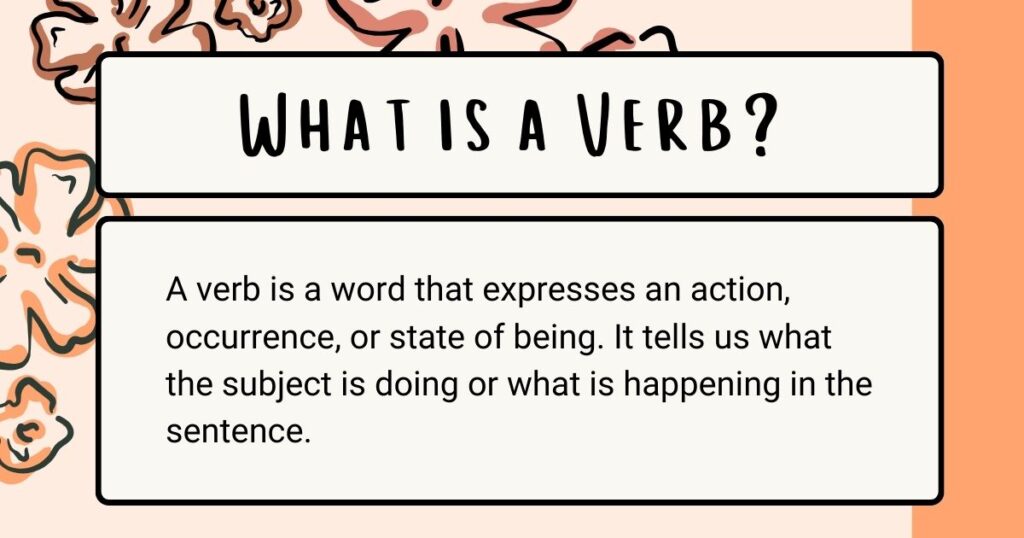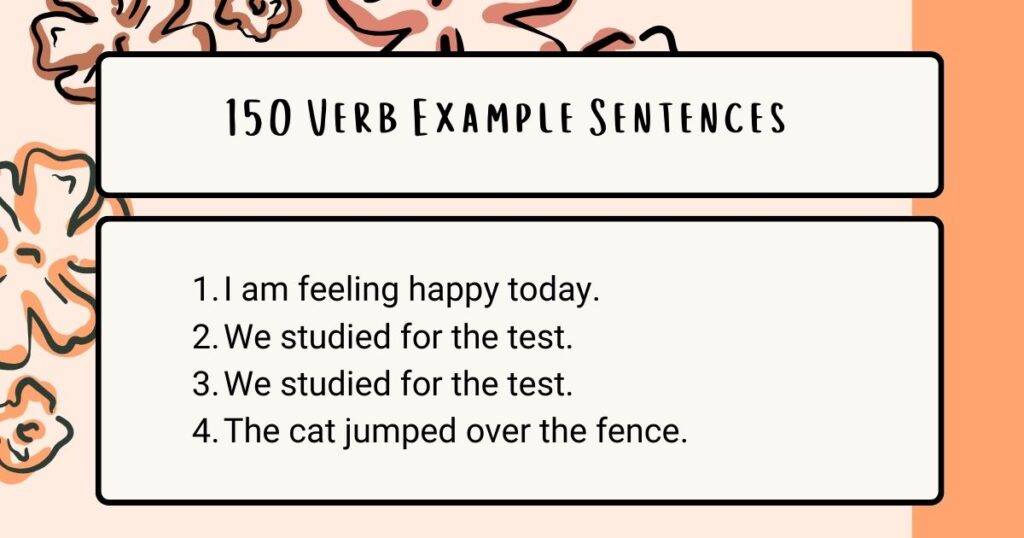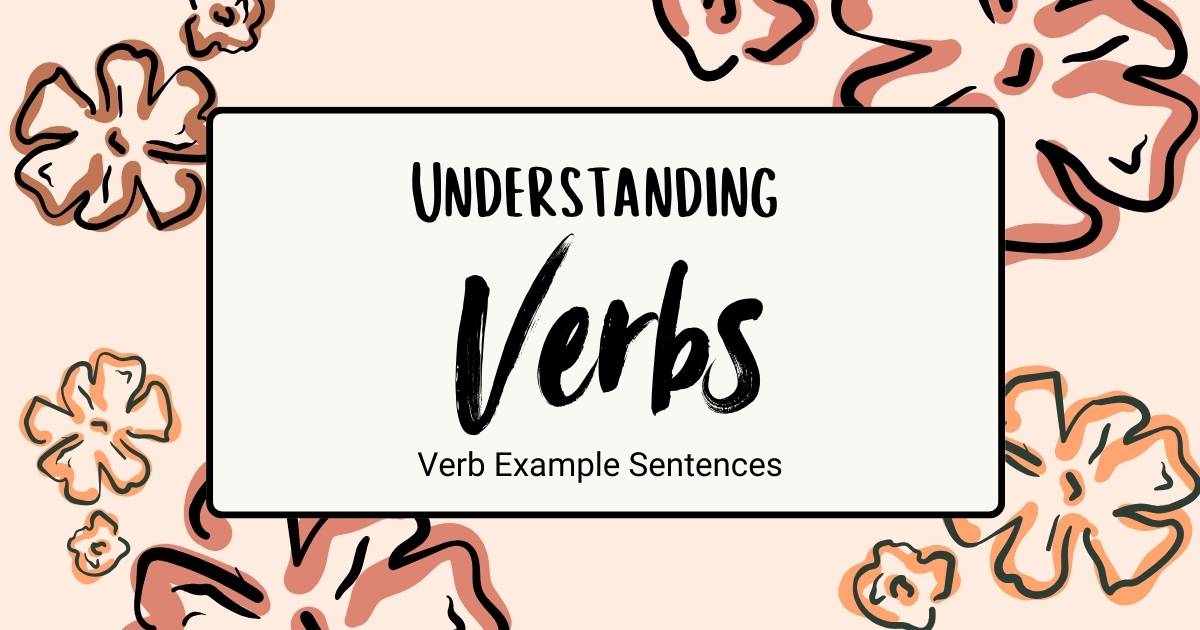Verb Example Sentences! Verbs are the action words in any sentence, helping to show what’s happening or being done. Whether you’re talking about eating, running, thinking, or laughing, verbs are essential. Using them correctly is key to clear communication.
In this collection, you’ll find 150 examples of sentences with verbs, showcasing a variety of tenses and actions. These simple sentences will help you see how verbs work in different contexts. Whether you’re learning English or looking for ways to improve your grammar, these examples will be helpful.
These verb examples will make it easier for you to understand how action words function in everyday speech and writing.
What is a Verb?

A verb is a word that expresses an action, occurrence, or state of being. It tells us what the subject is doing or what is happening in the sentence. For example, in the sentence “They laugh together,” the verb “laugh” describes the action.
Verbs can be in different tenses, showing whether an action is happening now, has happened, or will happen. They can also describe states of being, like “She is happy” where “is” links the subject to the state. Understanding verbs is key to constructing clear and meaningful sentences.
You can also read; 100 Ways to Say Take Care, Expressions of Care and Concern
List of 150 Verb Example Sentences

- She runs every morning.
- They play soccer on weekends.
- I am feeling happy today.
- We studied for the test.
- He writes in his journal every night.
- The cat jumped over the fence.
- She sang a beautiful song.
- I have a meeting at 3 PM.
- The children laugh loudly.
- They will leave tomorrow morning.
- He reads books in his free time.
- We watched a movie last night.
- They work at a software company.
- I will meet my friends after school.
- She danced gracefully across the stage.
- The sun sets in the west.
- He bought a new car.
- I am tired after the long day.
- They are cooking dinner right now.
- We traveled to Japan last summer.
- He ate his lunch quickly.
- She is studying hard for her exams.
- I gave him a gift for his birthday.
- They cleaned the house yesterday.
- We will celebrate our anniversary next week.
- She wrote an essay about the environment.
- The dog barked at the mailman.
- I called my mom earlier today.
- We are watching a new TV series.
- He laughed at the funny joke.
- The baby crawled across the room.
- I met my friend for lunch.
- They are listening to music.
- She wore a beautiful dress to the party.
- He fixed the broken chair.
- We went hiking last weekend.
- She painted a beautiful picture.
- I felt sick yesterday.
- They will travel to Paris next year.
- The teacher explained the lesson clearly.
- I am going to the gym later.
- He studied for the exam all night.
- She will sing at the concert tonight.
- We ate pizza for dinner.
- They slept for eight hours.
- The bird flew across the sky.
- I forgot to bring my lunch.
- They will play basketball tomorrow.
- We bought groceries this morning.
- He is reading a novel right now.
- I saw a shooting star last night.
- She jumped into the pool.
- We told him the good news.
- They are going to the park.
- He drank his coffee too fast.
- She bought a new phone.
- We sang songs around the campfire.
- He played the guitar beautifully.
- I have an important meeting soon.
- They are discussing the project.
- She is making dinner right now.
- I opened the door for him.
- We will visit the museum tomorrow.
- He arrived late to the party.
- The flowers bloom in spring.
- She is writing a letter to her friend.
- We walked along the beach.
- They did their homework together.
- He is practicing his speech.
- I found my keys under the couch.
- She will drive to the store later.
- We ate breakfast at a café.
- He studied abroad for a year.
- They are traveling to Italy next month.
- The children built a sandcastle.
- She gave a presentation at work.
- I heard a loud noise outside.
- He ran in the marathon last year.
- We walk our dog every evening.
- They are cooking dinner together.
- I saw a great movie last weekend.
- She is knitting a scarf.
- We will finish the project by Friday.
- He woke up early this morning.
- The artist painted a beautiful landscape.
- I am trying to eat healthier.
- She gave a speech at the conference.
- We traveled to the mountains last summer.
- He will start his new job next week.
- They are having a party tonight.
- She drove to the office this morning.
- I told her to be careful.
- We will walk to the park later.
- He sent me a postcard from vacation.
- She found her missing wallet.
- I enjoyed the concert last night.
- We had a wonderful time at the wedding.
- The chef cooked an amazing meal.
- She is finishing her project today.
- I need to call my friend.
- They are planning a surprise party.
- He ate all the cookies.
- We celebrated his promotion last night.
- She is learning how to play the piano.
- They watched a documentary about nature.
- I worked late last night.
- She smiled when she saw the gift.
- We will attend the conference next week.
- He ran into an old friend at the store.
- I bought a new pair of shoes.
- She is getting ready for her trip.
- We will start the meeting at 10 AM.
- He is playing video games right now.
- They drove across the country last summer.
- I listened to a great podcast today.
- She helped me with my homework.
- We watched the sunset at the beach.
- He played chess with his brother.
- They finished the task ahead of schedule.
- I will try that new restaurant tonight.
- She loved the surprise party.
- We baked cookies for the bake sale.
- He cleaned his room yesterday.
- They ate dinner at a fancy restaurant.
- I talked to my parents last night.
- She will join us for dinner.
- We are celebrating our anniversary this weekend.
- He moved to a new city last month.
- She found a great deal on a coat.
- I played basketball with my friends yesterday.
- They are helping with the event setup.
- I feel much better today.
- He laughed at my joke.
- We are learning new skills every day.
- She is thinking about a career change.
- They are waiting for the bus.
- I washed my car this afternoon.
- She joined the yoga class last week.
- We saw the play at the theater.
- He is driving to the airport.
- She felt nervous before the interview.
- They completed the project ahead of schedule.
- I enjoy watching documentaries.
- We are celebrating her promotion.
- He wrote a letter to his friend.
- She is designing a new website.
- I ate a delicious sandwich for lunch.
- They talked for hours on the phone.
- We will attend the wedding tomorrow.
- He enjoyed the vacation with his family.
150 verb example sentences showcasing a variety of actions, states, and occurrences:
FAQs
What is a verb?
A verb is a word that describes an action, occurrence, or state of being. It tells what the subject is doing or what is happening in the sentence.
How do I use verbs in different tenses?
Verbs can be used in different tenses to indicate when an action happens—past, present, or future. For example, “She runs” (present), “She ran” (past), and “She will run” (future).
Can a sentence have more than one verb?
Yes, a sentence can have multiple verbs. For instance, “She runs and swims every day,” where “runs” and “swims” are both verbs.
What is the difference between a regular and irregular verb?
Regular verbs follow a standard pattern for their past tense, like “talk” (talked). Irregular verbs do not follow the regular pattern, like “go” (went) and “have” (had).
How do action verbs differ from linking verbs?
Action verbs show physical or mental actions, like “run” or “think,” while linking verbs connect the subject to more information about the subject, like “is” or “seem.”
Can verbs be used without a subject?
In some cases, verbs can be used without a clear subject, such as in imperative sentences like “Run!” or “Stop!”
What are modal verbs?
Modal verbs are auxiliary verbs used to express ability, possibility, necessity, or permission. Examples include “can,” “could,” “must,” and “should.”
How do auxiliary verbs work with main verbs?
Auxiliary verbs, like “have,” “is,” or “will,” help form different tenses, voices, or moods. For example, “She is running” uses “is” as an auxiliary verb to form the present continuous tense.
What are transitive and intransitive verbs?
Transitive verbs require a direct object to complete their meaning, like “She eats an apple.” Intransitive verbs do not need a direct object, like “She sleeps.”
How do I identify verbs in a sentence?
To identify a verb, ask what the subject is doing or what is happening. For example, in “The dog runs fast,” “runs” is the verb because it tells what the dog is doing.
Conclusion
Verbs are essential in forming sentences because they describe actions, occurrences, or states of being. They help convey what is happening or what someone is doing. Without verbs, sentences would lack meaning and action, leaving them incomplete.
Understanding verbs is crucial for good communication, whether you’re telling a story, giving directions, or sharing an idea. By mastering how to use verbs correctly, you can express yourself clearly and effectively. So, verbs are truly the backbone of any sentence.

I’m John Smith, a language enthusiast dedicated to helping writers, students, and professionals master the art of clear and effective communication. Whether you’re looking for grammar tips, writing guides, or common mistake corrections, you’ll find valuable insights to improve your language skills. Let’s make grammar simple and fun!

